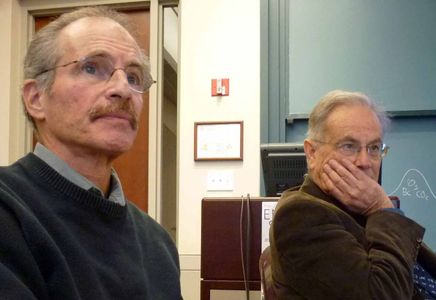Experts discuss Energy and Development at third Sawyer Seminar
On Monday, November 8, 2010, the John Sawyer Seminar on Energy Transitions and Society convened for its third meeting. The session entitled Energy and Development featured Joan Martínez -Alier and Paul Epstein, and was moderated by James McCann, professor of history at Boston University.

Joan Martínez-Alier is a Professor at the Department of Economics and Economic History, Universitat Autonoma de Barcelona, since 1975. His presentation emphasized the historical interrelation of energy and economic development critiquing it from the perspective of ecological economics and environmental justice. He addressed in particular agriculture as an energy system and the position of peasant groups, such as Via Campesina, in resisting agrofuels. Agrofuels, he argues, transforms agriculture from a producer of energy into a consumer of energy. In resisting such mode of agriculture and global warming, peasants draw on and develop concepts such as “food sovereignty.”
Paul R. Epstein is Associate Director of the Center for Health and the Global Environment at Harvard Medical School. He began his presentation by highlighting the vulnerabilities of energy infrastructures. He drew in particular on the lifecycle analysis of coal, biofuels, and nuclear to highlight their environmental, public health, and social costs and risks. He called for clean energy as part of the adaptation to climate change and raised the significance of thinking about healthy solutions, global governance, and the necessary financial and policy instruments to implement such desired transition.
Following the presentations the audience engaged in a lively discussion. James Mccann invited the speakers to think of a sustainable energy future that guarantees the future of small holders. Participants discussed the political and financial role as well as the desired interventions of companies and government agencies. Some of the other issues discussed included how to account for subsidies and externalities in calculating the real cost of energy. Participants concluded on the necessity to unpack the historical conceptual overlaps of Development and Economic Growth and how to envision an alternative energy future through the lens of “décroissance” economics.

The seminar series, supported by a grant from the Andrew W. Mellon Foundation, meets once each month during the Fall 2010 and Spring 2011 semesters. The first two sessions, entitled Overview of Energy Transitions and Energy, Culture, and Society brought together leadings scholars to discuss various aspects of how energy transitions are themselves socially constituted and how they have, and are likely to, impact society. The forthcoming seminar, on The Business of Energy will be held on Friday, December 3.
For more information on the Sawyer Seminar series, please go here.